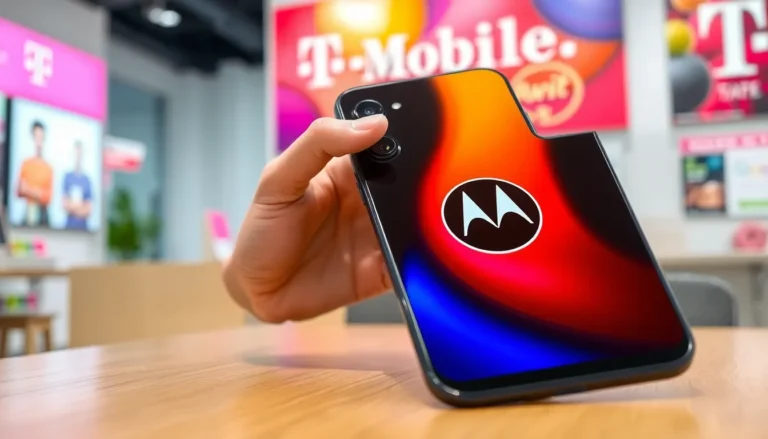Mobile gaming apps have taken the world by storm, turning everyday moments into epic adventures. Whether it’s a quick match during a coffee break or an all-night gaming marathon, these apps fit seamlessly into busy lives, offering excitement at the tap of a finger. Who needs a gym membership when you can flex your strategy skills in a battle royale?
Table of Contents
ToggleOverview of Mobile Gaming Apps
Mobile gaming apps represent a significant segment of the entertainment industry. They provide easy access to games wherever users go. Convenience plays a key role; players can enjoy mobile games during commutes, breaks, or leisurely home time.
Statistics indicate that mobile gaming generated over $100 billion in revenue in 2020, showcasing its prominence. Players engage with a wide variety of genres, including action, puzzle, and role-playing games. This diversity allows users to find games that fit their preferences and lifestyles.
Innovative technologies enhance the mobile gaming experience. Augmented reality (AR) and virtual reality (VR) create immersive environments that captivate players. Developers constantly adapt to changes in technology, ensuring that gaming remains engaging.
Social interaction is another crucial aspect. Many mobile games include multiplayer features that foster connections among players. Gamers can compete with friends or collaborate with strangers, building communities within apps.
User-friendly interfaces are designed to accommodate various skill levels. Whether a beginner or a veteran, individuals can seamlessly navigate apps, enhancing overall satisfaction. Regular updates keep content fresh and encourage ongoing participation.
Mobile gaming apps continuously thrive due to their accessibility, engaging experiences, and social features. They also cater to different preferences, ensuring players find something enjoyable. Ongoing technological advancements further enrich gameplay, solidifying their role as a staple in modern entertainment.
Popular Genres of Mobile Gaming Apps
Mobile gaming apps encompass a variety of genres that cater to diverse player preferences. Each genre provides unique experiences, attracting audiences of all kinds.
Action and Adventure Games
Action and adventure games dominate the mobile gaming landscape. Players engage in thrilling narratives while completing quests and exploring expansive worlds. Popular titles like “Genshin Impact” encourage players to develop strategies for combat and character growth. Engaging graphics and sound design enhance immersion, making gameplay captivating. These games often include multiplayer options, allowing friends to join the adventure. The combination of exploration, challenging enemies, and intricate storylines keeps users coming back for more.
Puzzle and Strategy Games
Puzzle and strategy games attract those who enjoy problem-solving and critical thinking. Titles like “Candy Crush Saga” or “Clash of Clans” exemplify this genre, offering players engaging challenges that require strategic planning. Levels often increase in difficulty, pushing players to refine their skills over time. Many games incorporate social features, allowing players to compete against friends or collaborate in teams. These elements foster a sense of community and encourage regular play. Mobile convenience adds to the appeal, allowing gamers to enjoy these challenges during short breaks or long commutes.
Simulation and Role-Playing Games
Simulation and role-playing games provide immersive experiences that mimic real-life scenarios or fantastical narratives. Games like “The Sims” or “Final Fantasy XV Pocket Edition” allow players to create characters and develop unique storylines. Players often manage resources or navigate social dynamics, fostering deeper engagement. Customization options enhance personalization, making each gaming experience unique. Both simulation and RPG genres encourage exploration, inviting players to uncover hidden elements within the game’s universe. The option to connect with others through multiplayer setups adds even more depth to these interactive adventures.
Features of Mobile Gaming Apps
Mobile gaming apps offer a variety of features that enhance user experience and engagement. These elements play significant roles in their growing popularity.
User Interface and Experience
User interfaces in mobile gaming apps prioritize simplicity and accessibility. Intuitive controls allow players to navigate games easily, regardless of their skill level. Engaging graphics and sound design immerse users in gameplay, enhancing emotional connections to the game. Touchscreen capabilities enable users to interact directly, which increases satisfaction and enjoyment. Each app’s unique design often reflects genre characteristics, making it easy for users to discern their preferred game types. Frequent updates improve usability and fix bugs, contributing to ongoing positive experiences.
In-App Purchases and Monetization
In-app purchases make mobile gaming apps financially viable while enhancing user engagement. Players often buy in-game currency, special items, or premium features to elevate their gaming experience. Various monetization strategies, such as ads and subscriptions, cater to different user preferences. For instance, some players prefer ad-supported models with optional purchases, while others opt for monthly subscriptions for ads-free gameplay. This flexibility increases player retention and satisfaction. Revenue generated from these purchases significantly contributes to the mobile gaming industry’s exponential growth, surpassing $100 billion in 2020.
Trends in Mobile Gaming Apps
Mobile gaming apps continue to evolve, showcasing impressive trends that shape user experiences and engagement. The integration of innovative technologies drives the industry forward, enhancing gameplay and accessibility.
Augmented Reality Integration
Augmented reality (AR) integration in mobile gaming apps creates immersive experiences that blend digital elements with the real world. Games like “Pokémon GO” exemplify how AR encourages players to explore their surroundings while interacting with captivating virtual environments. Users engage in real-time challenges, fostering a sense of community through shared experiences. This technology attracts diverse player demographics, appealing to casual gamers and AR enthusiasts alike. Developers increasingly adopt AR to elevate storytelling while providing unique gameplay mechanics that enhance user interaction.
Cloud Gaming Services
Cloud gaming services revolutionize how players access mobile games, reducing the need for high-performance devices. Services like NVIDIA GeForce NOW and Xbox Cloud Gaming stream games directly to smartphones, enabling users to experience console-quality graphics and performance. This trend democratizes access, allowing players with varying hardware capabilities to enjoy premium titles. Players benefit from instant gameplay without lengthy downloads or updates, fostering convenience and engagement. Additionally, cloud gaming encourages developers to create richer, more demanding games, pushing the boundaries of mobile gaming and expanding user horizons.
Future of Mobile Gaming Apps
Mobile gaming apps are set to undergo transformative changes driven by technological advancements and user preferences. AR technology plays a crucial role in creating immersive gaming experiences, as observed in popular titles that encourage exploration of real-world environments. Cloud gaming services revolutionize access, permitting users to play high-quality games on various devices without the necessity for high-performance hardware.
Innovative monetization strategies will continue evolving, providing developers with new revenue opportunities while enhancing player engagement. Subscription models may dominate, offering players access to a wider range of titles for a fixed fee, promoting continued interaction with games. Customization options will likely increase, giving players more control over their gaming experiences and character designs.
The rise of competitive gaming has fueled the demand for mobile esports, leading to more titles optimized for fast-paced, tactical multiplayer gameplay. Enhanced social features are crucial for creating community-driven experiences, enabling players to form connections and compete against one another. Developers are likely to prioritize community interaction through in-game events, tournaments, and leaderboards.
User experience remains central to the future of mobile gaming. Simplified interfaces and improved graphic capabilities will attract diverse player demographics, ensuring accessibility for all. Regular updates and expansions will keep content fresh, inviting players to return for new challenges.
As mobile technology continues to advance, integration with wearable devices might enhance gameplay further, allowing for novel interactions and gameplay mechanics. This expansion hints at the potential for cross-platform play, creating a seamless gaming experience across various devices. Mobile gaming apps will adapt to these changes and maintain their significance as a leading segment within the entertainment industry.
Mobile gaming apps have revolutionized how people experience entertainment on the go. Their ability to seamlessly fit into busy lifestyles makes them a preferred choice for many. With diverse genres and innovative technologies enhancing gameplay, these apps cater to a wide range of preferences.
The future looks bright as advancements in AR and cloud gaming continue to shape the industry. As developers focus on user experience and community engagement, mobile gaming will likely maintain its significant role in the entertainment landscape. The ongoing evolution promises exciting possibilities for players, ensuring that mobile gaming remains a dynamic and engaging option for everyone.




